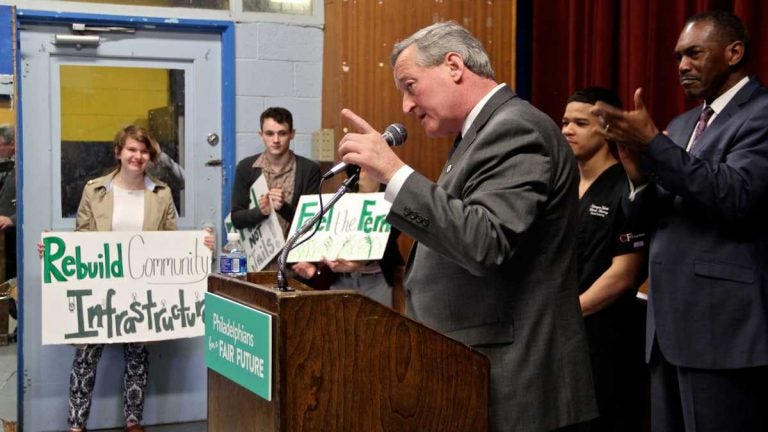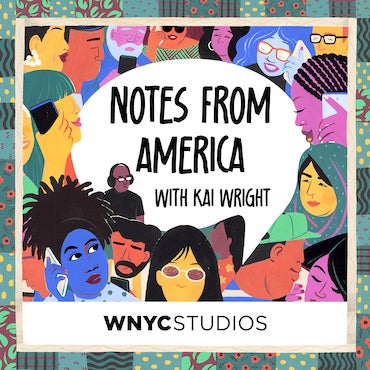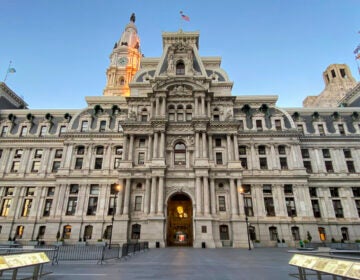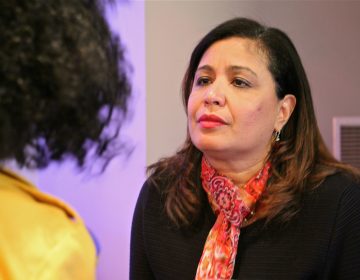Lobbying war over Philly soda tax still waged by the millions
Although the tax survived a courtroom challenge filed by the industry in July 2018, the lobbying has only intensified.

Mayor Kenney pitches sugary drink tax as key for his Pre-K and Rebuild initiatives, March 2016 (Emma Lee/WHYY)
This story originally appeared on PlanPhilly.
—
Campaigns related to Philadelphia’s controversial sweetened beverage tax accounted for 40 cents on every dollar spent to influence Philadelphia legislation in 2018, according to a WHYY analysis of lobbying disclosures.
Special interest groups overall spent more than $6 million lobbying Philadelphia City Hall and on other efforts to influence city policies in 2018.
The biggest spenders by far were the beverage industry and its opponents, two groups locked in a costly war to sway public opinion over the city’s tax on sweetened beverages. Although the tax survived a courtroom challenge filed by the industry in July 2018, the lobbying has only intensified. In the case of the American Beverage Association, the majority of their lobbying expenses were logged after the Pennsylvania Supreme Court ruling.
Two groups, Philadelphians for a Fair Future and the American Beverage Association, shelled out a combined $2.6 million on these services. Some went to professional lobbying, but the vast majority went towards advertisements and outreach efforts.
Casinos, law firms, telecom giant Comcast, and other business interests made up the remaining $3.7 million in spending.
Anthony Campisi, a spokesperson for the ABA, said that the $1.5 million his organization spent on lobbying in the city was meant to counteract public advocacy by the Mayor Jim Kenney.
Kenney, who announced his run for a second term as mayor earlier this month in a video, first pitched the tax in 2016 as means to fund his mayoral agenda.
“What we’re up against is the bully pulpit of the mayor who gets a ton of free press when he goes anywhere,” Campisi said. “We haven’t given up on the idea that this tax should be repealed in whatever way necessary.”
These so-called “indirect communications” are aimed at influencing voters — that’s everything from print advertisements and social media ads to in-person meetings with community groups, which depict the tax as a job killer.
Meanwhile, Kenney’s allies — which include health-conscious billionaire Michael Bloomberg — have spent nearly as much to counteract these efforts.
Kevin Feeley, a spokesperson from Philadelphians for a Fair Future, said his organization poured just more than $1 million into outreach campaigns spotlighting city programs funded by the soda tax. He said the expenses were money well spent against an industry lobbying with what he described as virtually infinite resources.
“We’re playing defense against an organization that…will stop at nothing to overturn the tax in Philadelphia,” he said.
The city’s tax on sugary beverages is closely tied to the Kenney administration’s goals. The $78 million dollars brought in by the tax funds key initiatives that the mayor campaigned on, including expanded pre-Kindergarten and the public works project known as Rebuild.
Both the ABA and Fair Future together spent another $2 million in Harrisburg, where beverage companies have been seeking state legislation that would overturn the tax. In total, the two groups reported $6.3 million in combined lobbying expenses last year.
WHYY is your source for fact-based, in-depth journalism and information. As a nonprofit organization, we rely on financial support from readers like you. Please give today.







